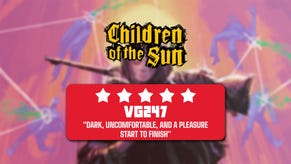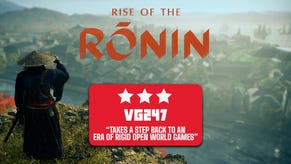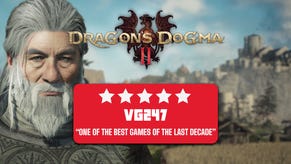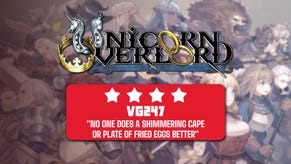DmC Definitive Edition PS4 Review: SSadistic, Not SSSensational
Drink every time you hear "Sons of Sparda" or "Nephilim".
This article first appeared on USgamer, a partner publication of VG247. Some content, such as this article, has been migrated to VG247 for posterity after USgamer's closure - but it has not been edited or further vetted by the VG247 team.
I liked DmC Devil May Cry the first time around. The original release on PlayStation 3, Xbox 360, and PC was an enjoyable reboot to Capcom's stylish action series. It was a reboot full of controversy and teeth-gnashing, but when I finally loaded it up on PC, I was pleasantly surprised by what Heavenly Sword developer Ninja Theory had created.
DmC: Definition Edition is a second chance for the second Dante. Though DmC wasn't a bad game by any stretch, it is the second lowest-selling game in the franchise, beaten only Devil May Cry 3. Capcom was so busy looking for a wider audience that it never stopped to ask if there really is a wider audience for this type of game. And once Capcom and Ninja Theory decided to leave the Devil May Cry hardcore behind, there's was some animosity left in its place.
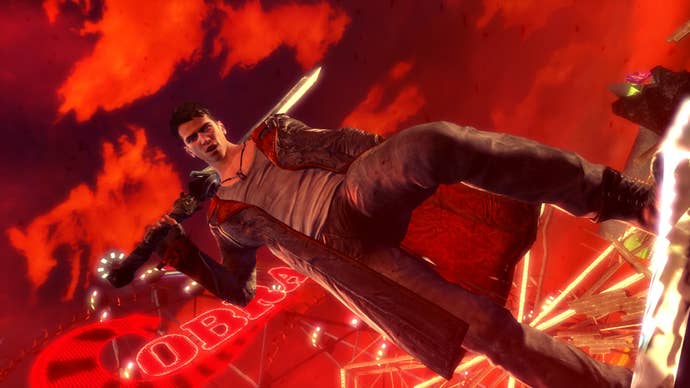
If you've played the PC version of DmC, the Definitive Edition doesn't offer much on the surface outside of the improved presentation and DLC. The game now runs in smooth 1080p resolution at 60 fps, versus the 30 fps of the original. That alone will probably make a number of fans happy. It doesn't feel locked, but it is rather consistent. Some of the crazier levels in the original DmC look great on PlayStation 4 and Xbox One, even if they don't touch the visuals on a top-of-the-line PC.
You also get the DLC, Vergil's Downfall, which expands Vergil's story a bit, and Vergil's Bloody Palace, a new version of the challenge mode DLC with a playable Vergil and increasing difficulty. To sweeten the pot, Ninja Theory has added a host of other small changes and additions, like the new Devil May Cry Dante and Vergil skins or the Turbo Mode, which speeds up the basic game. I'll talk about the rest of the new features as they relate to the original title.
As I've said before, I feel like DmC was the right game with the wrong name. Names mean something and carry within them a certain expectation. With the name "Devil May Cry", veteran fans were left disappointed when DmC wasn't a full revitalization of that original title. Without the name, many probably wouldn't have picked the game up at all. DmC ultimately carried the spirit of Devil May Cry forward in some ways, but in others it left that spirit behind. My first and foremost problem is the tone.
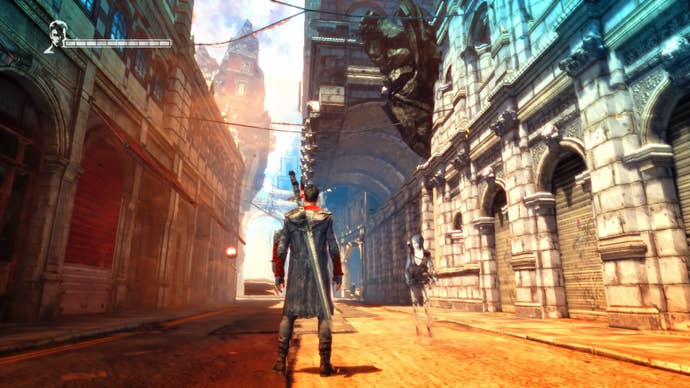
DmC drops a brand-new young Dante into Limbo City, a brainwashed town controlled by the demon Mundus. Mundus rose to power with the help of the demon knight Sparda, but Sparda married an angel, went legit, and had twin boys: Dante and Vergil. You can never leave the life though, so Mundus tore up their happy home life, killed Dante's mother Eva, and exiled Sparda. That left two half-angel/half-demon orphan boys who were mind-wiped and left to their own devices. Dante inherited the sword Rebellion, while Vergil received the katana Yamato. Vergil was an overachiever, becoming the leader of the insurgent Order, while Dante is just a party animal.
It's a decent set up, but the problem is DmC misses the overall tone of Devil May Cry and Dante. Part of Dante's amazing charm is the fact that he's a cartoon in a world where everyone else is dour, serious, and focused on ancient wars and destiny. He's there to have fun. Yes, his abilities - the strength, the magical weapon, and the healing factor that allows him to survive anything - are the result of a bum life deal that just keeps going, but that never seems to phase the character.
DmC's Dante lives in his world too much. There's bright moments where the old Dante shines through and I could almost believe this young buck will eventually reach the original's mindset, but for most of the game it's just him reacting directly to the anger and darkness of the world around him. The story is corny, the dialog gets adolescent and puerile at times, and in the end new Dante feels more like a missed opportunity than a failure. Devil May Cry needs to hit that balanced tone to make the whole thing work; Ninja Theory missed here.

They succeeded on the combat system though. Dante is half-angel, half-demon and that duality is felt throughout the combat system. Outside of his original sword (Rebellion) and his guns (Ebony and Ivory), all of Dante's moves rely on one of the two halves. You can switch between either half on the fly and Ninja Theory did an excellent job making the combat fast and fluid.
The angel side is flexible, with a crowd-killing sickle, wicked shuriken, and moves that emphasize Dante's speed. The demon half is far more forceful, wielding a massive, heavy axe and two burning gauntlets. Angel Evade gives Dante more distance and his Angel Grab pulls Dante toward enemies and platforms. Demon Evade is gives you an attack boost and Demon Grab pulls enemies and platforms toward you. Into this sublime system, Definitive Edition adds a manual target lock, pulling DmC closer to the original Devil May Cry. Thematically and mechanically, DmC's combat system was just great, allowing players to switch between a number of styles whenever they want, but this improvement is welcome. It's all about the options.
The second major problem of the original DmC was the difficulty. Devil May Cry fans love difficult games with tense combat. DmC on the other hand, allowed you to have more fun and freedom on each of its difficulty settings. The style system that ranked your combos was far more forgiving and losing high ranks was less frequent. Ninja Theory has gone back and retuned the game for the hardcore fans, changing parry and evade windows and fixing game exploits. With just those changes, the game feels tighter, but not wildly different. The studio didn't stop there though.

On any difficulty and level you can turn on Hardcore Mode, which makes ranking up much harder and causes your style ranks to diminish much faster. Parrying also becomes more difficult and your foes deal more damage. Sweet, right? Then there's Must Style mode, which makes it so that you can't damage enemies unless you're at S rank or above. What? You want the game to be even harder? Enter the highest difficulty level, Gods Must Die, which slots in above the old game's Dante Must Die Mode. You can make DmC Definitive as hard or easy as you want it and the higher difficulty options are rather punishing.
DmC was a great game. DmC Definitive Edition is even better. Yes, the game still falters on the presentation of Dante and his world. Yes, DmC's original impact is blunted by the majesty and scope of Bayonetta 2. Yes, it's still an offshoot of the original Devil May Cry, without the real Uncle Dante. For $40, I still think it's worth a pick-up on PlayStation 4 and Xbox One. Hell, I'm hoping they're bringing some of the new features to the PC version. DmC isn't Devil May Cry, but it's still an awesome time and the Definitive Edition is a great package.
InterfaceStylish hard interface.
Lasting AppealLike most action games, most of the replay is based on going back into levels to find hidden items and get better letter grades. If that's not your thing, you'll be done pretty quick.
SoundHope you like gritty rock, because the soundtrack leans heavy on it.
VisualsDmC looked great on PC and Definitive Edition brings its console counterparts up to those standards.
ConclusionDmC Definitive Edition beefs up the excellent original with better graphics, all the DLC, retuned combat, and a host of difficulty modes. If you loved the original, Definitive is better. If you were avoiding it because you're a Devil May Cry purist, Definitive is closer to the original series than ever before.


